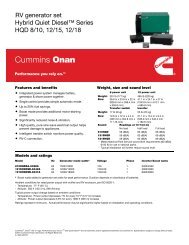Air Brake Manual
Air Brake Manual
Air Brake Manual
Create successful ePaper yourself
Turn your PDF publications into a flip-book with our unique Google optimized e-Paper software.
Safety Tips<br />
1. Reminder - is your commercial trailer equipped<br />
with the mandatory retro-reflective markings In<br />
January 2002, under the motor vehicle inspection<br />
program, all trailers must now be equipped with<br />
retro-reflective markings. Be seen - be safe.<br />
2. Seatbelts Save Lives - Please Buckle Up - The Life<br />
you Save May Be Your Own<br />
The proper use of occupant restraints has become<br />
the most cost-effective method to reduce death and<br />
injuries resulting from motor vehicle collisions.<br />
3. Animals on the Highways - Slow Down - Please<br />
Be Alert.<br />
- Drivers should use caution especially at dawn and<br />
dusk when the animals are on the move.<br />
- Animals are unpredictable so reduce your speed.<br />
- Stay alert and scan both sides of the road, not just<br />
the pavement in front of your vehicle.<br />
4. Cellular Phones - Cellular telephones are an<br />
important safety aid for drivers. Many people use<br />
their cellular telephone to report accidents and<br />
crimes and for their personal safety when their<br />
vehicle breaks down or they are lost.<br />
- Use a hands-free device to make it easier to keep<br />
both hands on the wheel.<br />
- When dialling manually, dial only when stopped, or<br />
have a passenger dial for you.<br />
- Avoid unnecessary calls and keep conversations<br />
to a minimum.<br />
- Be familiar with the various functions of your<br />
cellular phone and program frequently dialled<br />
numbers.<br />
- Do not use your cellular phone when driving<br />
conditions are hazardous.<br />
- Remember it is an offence under the Motor Vehicle<br />
Ac to drive without due care and attention.<br />
5. SEE AND BE SEEN! - Turn on your headlights.<br />
6. DRIVER DISTRACTIONS - Many everyday habits<br />
of drivers are dangerous and can lead to crashes.<br />
Distractions such as eating fast food, drinking<br />
coffee, changing the radio station, switching CDs or<br />
tapes, talking on a cellular phone or trying to keep<br />
an eye on a young child in the vehicle increases the<br />
risk of being involved in a collision. All drivers<br />
should drive defensively and be prepared for the<br />
unsafe actions of other motorists or for poor driving<br />
conditions. Expect the unexpected.<br />
7. Operation Lifesaver reminds all drivers to stay<br />
alert at all times and especially when crossing a<br />
railway track.<br />
- Be careful - low slung trailer units can get stuck on<br />
raised crossings.<br />
- Know the length of your truck and trailer. When<br />
you see a signal or stop sign be certain you have<br />
enough room to completely clear the railway tracks<br />
before crossing.<br />
Take Care of Yourself!<br />
The most important part of a moving truck or bus is<br />
the driver! Get plenty of rest before getting behind<br />
the wheel. Eat well and stay fit. Remember, hours of<br />
service violations are serious and can threaten your<br />
livelihood or even your life. Stay healthy and well<br />
rested, or don’t drive.<br />
Always Maintain Your Vehicle<br />
Inspect your vehicle before each trip and check<br />
your brakes regularly. Learn how to inspect your<br />
brakes, identify safety defects, and get them<br />
repaired before risking your life and others on the<br />
highway.<br />
Slow Down in Work Zones<br />
Watch out for highway construction. Stay alert.<br />
Work zone crashes are more likely to happen during<br />
the day. Almost one-third of fatal crashes in work<br />
zones involved large trucks. Take your time going<br />
through work zones and give yourself plenty of<br />
room. Expect the unexpected.<br />
Always Keep Your Distance<br />
Always leave enough space between you and the<br />
vehicle in front of you. If you hit someone from<br />
behind, you are typically considered “at fault”,<br />
regardless of the situation. Large trucks require<br />
more stopping distances than other vehicles. Take<br />
advantage of your driving height, and anticipate<br />
braking situations.<br />
Always Drive Defensively<br />
Avoid aggressive drivers! It is estimated that each<br />
year, two-thirds of all traffic fatalities are caused by<br />
2




